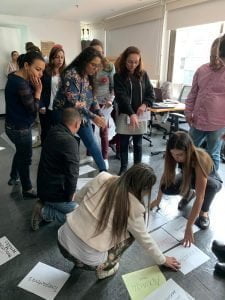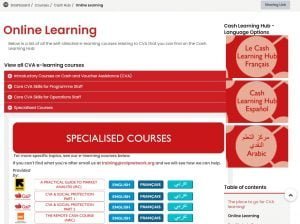Turning the page on traditional learning: Why the CALP Network’s new online course is so exciting

Has learning changed for good?

In the humanitarian world, training and capacity building for staff and volunteers has always been a critical component to supporting quality programming, and helps to upskill thousands of people around the world to deliver better quality aid for people in crises. Traditional face to face training will always remain a great way to access knowledge and information, and learning from other people’s experiences (peer-to-peer learning) is one of the best ways to ensure learning retention. Yet the world has changed significantly in the last few years, and the way that we access learning has moved on.
Even before the pandemic, one of our biggest struggles at the CALP Network was gaining physical access to countries like Yemen or North-East Syria to deliver face to face training, where conflict, limited visas and an ever-changing situation on the ground led to countless cancelled training events. In addition, many under-served regions and countries often struggled to get training events organised if they were not a high enough priority for donors or humanitarians. We all know that training staff before an emergency is an important part of any preparedness strategy, but getting the funding to do so can be challenging.
At the CALP Network, we are always looking at how we can improve access to our training materials, and how we can reach more people in the most effective way possible. And I don’t just mean under-served regions or conflict zones either. A lot of people find doing an intense training course for 8 hours a day for 5 days physically and mentally exhausting. Additionally, many people with disabilities are often not able to travel or access training venues. This can be a huge barrier to accessing learning, and most training venues and training providers don’t offer facilities such as simultaneous sign-language or options for vison-impaired people either.

Women are also often at a disadvantage in face to face trainings in many countries due to potential stigma or safety concerns involved in travelling to a venue or staying in a hotel alone. Recent research has also indicated that women are at a disadvantage in face to face settings, with men often dominating the space and perpetuating gender stereotypes.
“Whilst…many workplaces don’t experience direct divisions between genders in classroom settings, it’s important to acknowledge that women come to a classroom setting with learned reservations and assumptions that dominant male voices will rule. Digitising learning where possible removes this conversation entirely, allowing people to learn – and excel – in a way that works for them.”
Source: Kallidus Learner Survey 2021
All this, and more, is why our new online course is so exciting.
the CALP Network Online: Core CVA Skills for Programme Staff Course
We spent more than a year researching different learning methodologies, understanding what humanitarians want in terms of training opportunities, looking at completion rates for existing distance learning courses, and comparing blended learning options, before coming up with the blueprint for our new online course. And then we spent over a year developing and testing the course materials to make sure we got it right!
The course contains much more bite-sized content, such as short e-learnings and videos, which can be accessed on-demand at any time and are increasingly popular for learners. We’ve made sure our new content is accessible on mobile phones and tablets as well as laptops and computers to meet the evolving trends in how people access learning both at home and in the office. Studies have shown that this type of microlearning content is much more accessible to women, especially when fitting their professional development around family and caring commitments, as well as working better for people with disabilities, offering more opportunities for inclusion, such as subtitles and screen-readers. And while Covid-19 wasn’t our motivation, in the context of the pandemic, there has never been a better time to make more learning content accessible virtually to the wider humanitarian community.
Our online course materials can be accessed whenever and wherever it suits you, whether you are about to do a market assessment, and want to watch a quick video for tips and advice before you start, or you want to sign up to a 12-week facilitated course to learn alongside others in a virtual setting.
The only thing you need is an internet connection, and while we know there are many countries where connectivity is a challenge, we are now living in an age where almost everyone conducts their business online, whether it is email communications, or using online data collection software to register beneficiaries, there are very few humanitarians who cannot get online at all.
We’ve worked hard to bring in as much peer-to-peer learning as we can to try and replicate the value of such rich experiences in a face to face training. This is done through the facilitated online workshops and group activities, as well as through our Network Perspectives video series, where we collated tips and advice on Cash and Voucher Assistance (CVA) from more than 50 people involved in CVA across our network.
NEW ‘Network Perspectives’ playlist just released! If you could pick the brains of a diverse range of cash experts & practitioners from around the world wouldn’t it be fascinating? Good news – we’ve done it for you – watch & learn https://t.co/Uh8OZqSj1I pic.twitter.com/nNa4tTJ8ew
— the CALP Network (@calpnetwork) June 22, 2021
We believe we have created an online course that is truly unique, delivered through a wide range of different mediums to maximise on learning retention while meeting the needs of humanitarian learners.
Our 12-week facilitated course is designed to require no more than 3 hours of learning per week from you as a learner, to enable humanitarian professionals with busy working lives to take part and fit it around their working week and care work commitments, as well as to be more accessible to people with disabilities.
And for those learners who cannot get a space on a facilitated course, we have made all the online course materials available in English, French and Arabic (with Spanish coming soon). In each language, there are 21 new e-learning courses, 14 new training videos, and 16 Network Perspectives videos to explore. You don’t need to sign up to access them, there is no cost and no catch – just go to the CALP Network’s Cash Learning Hub on Kaya and start exploring what’s on offer.

the CALP Network’s new online course includes a total of 51 new pieces of micro-learning available in Arabic, 51 in French, and 51 in English (and Spanish is not far behind!). This represents a HUGE contribution to the humanitarian sector in terms of freely accessible, on-demand learning on CVA, and we feel this represents a step-change in our commitment to inclusion and providing open-source learning on CVA for the wider humanitarian sector.
And in case you can’t tell, we’re pretty excited about it. Check it out today!
Cover image – Woman engaged in online learning. Photo by RODNAE Productions from Pexels


